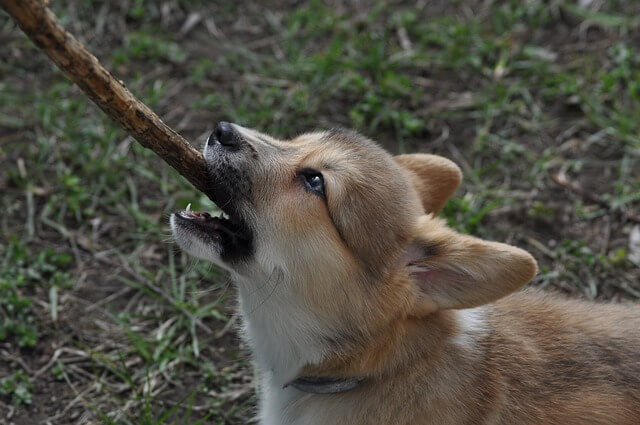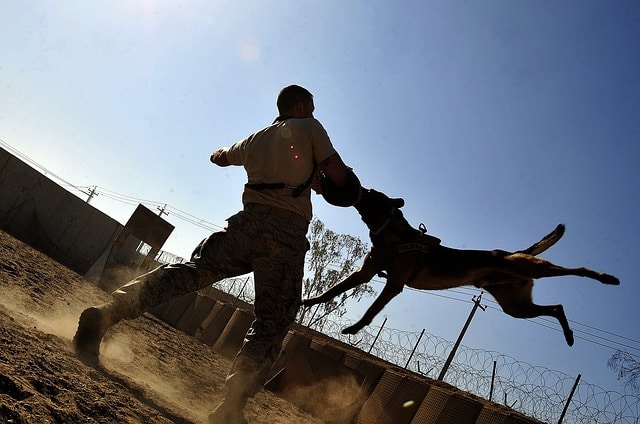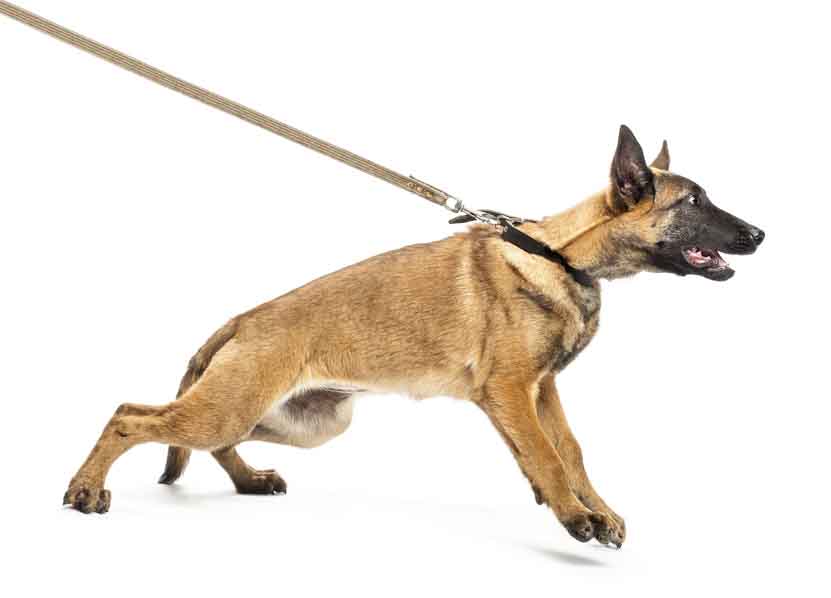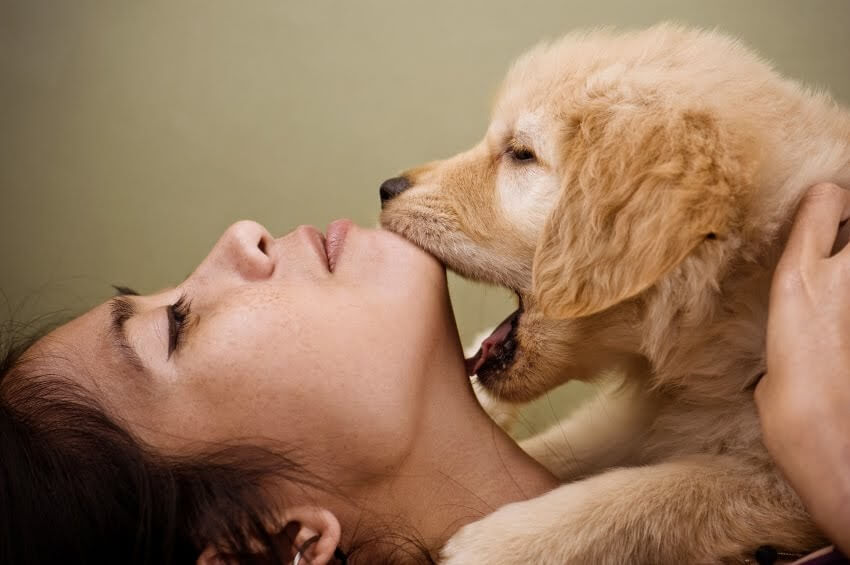Bite inhibition refers to a dog’s ability to control the pressure of its bite during play and interaction with humans and other dogs.
Pups are usually trained to inhibit the force of their bite so as not to cause injury.
Dogs have a natural bite force of 220-560 PSI (pounds per square inch) depending on the breed. Learn more here.
To put it in context, humans have a bite force of 120 PSI. This means a dog can cause serious damage if they bite without inhibition.
A dog with good bite inhibition is less likely to cause injury in play or self-defense and is generally considered more safe and easy to handle.
This is why every domesticated dog should be taught to inhibit their bite.
When to Start Teaching Bite Inhibition

You should start teaching bite inhibition at a tender age to make sure your pup grows up to be a well-behaved and safe companion.
The best time to start teaching bite inhibition is when your pup is between 8 and 16 weeks old.
At this age, puppies are in the early stages of teething and are starting to play with each other and their owners.
This is a crucial time for teaching bite inhibition because this is when pups learn how to use their mouths and bite force.
To teach your pup bite inhibition, you can use a variety of techniques, such as using toys and treats, playing games, and using positive reinforcement.
You can also use verbal cues, such as “gentle” or “soft,” to reinforce the desired behavior.
When your puppy bites too hard, you can say “ouch” or “stop” and stop playing with them for a few seconds.
ASPCA also recommends using high-pitched yelps to indicate to your dog that you have been hurt. This will help your puppy understand that biting too hard is not acceptable.
However, it is worth noting that teaching bite inhibition is a gradual process and requires patience and consistency.
You’ll need to reinforce the desired behavior regularly and be patient with your puppy as they learn.
You can also work with a professional dog trainer to help you with this training.
When Is It Too Late To Teach Your Dog Bite Inhibition?

Ever heard the saying, you can’t teach old dogs new tricks?
Well, there is some truth in it. Even though it is possible to train old dogs, it is not easy and chances are you will need the help of a dog training expert.
Strictly speaking, it is never too late to teach bite inhibition although it is way easier if you start when the dog is younger.
By the time the dog grows into an adult, she will have developed biting habits that may be hard to break.
Furthermore, an older dog may not adjust to new training methods as easily as a pup would.
If you have an older dog who has a serious biting problem, all hope is not lost because your dog can still undergo some behavior modification training.
However, the process will be slower and harder and you may not achieve the desired results without an expert’s help.
Can Older Dogs Learn Bite Inhibition?

As we have already established, it is never too late to teach bite inhibition, so yes, older dogs can learn bite inhibition.
However, older dogs are not very easy to train.
In fact, the AKC recommends that any dog that hasn’t learned bite inhibition by the time they are 6 months or older should be referred to a certified dog trainer or an animal behavior specialist.
When training bite inhibition to older dogs, it is important to differentiate arousal biting from aggressive biting.
Arousal biting is when a dog bites to express playfulness or happiness.
On the other hand, aggressive biting is usually a result of overstimulation or frustration and it is a dog’s inbuilt defense mechanism.
Both types of biting can be trained out of the dog but the techniques may differ.
For instance, using aversive and dominance-training techniques may be counterproductive for dogs that are biting out of frustration.
The training will only make them more frustrated, which will increase their propensity to bite. This is why you should leave training older dogs to the pros.
Also check: Why Does My Dog Bite Me When Excited?
Bite Inhibition Training Not Working For My Dog: What Can I Do?

Different dogs will respond differently to bite inhibition training.
Some will learn quickly while others will take time.
You should be patient with your pup and do not try comparing them to others because even sibling pups have different personalities.
Here are a couple of things you can do if the bite inhibition training seems not to work.
I. Change the training method
The first tip is to change the training method you have been using.
For instance, if you were yelling at your dog when he bites, you may want to try a different approach.
Even though some suggest that yelling is a good training method, some studies have found that yelling will do more harm than good. Even if the training works, the dog will not live a happy life.
II. Reward and punish
If you have not tried it already, try to use the reward and punish approach.
Basically, it entails rewarding good behavior and punishing bad behavior.
When playing with your dog, punish him each time he bites you e.g. by pulling away and ignoring him for a couple of seconds.
Consequently, when he does not bite, reward him with e.g. with kisses, brushing, or a dog treat.
III. Ask for help
If you still do not see any chance, then you may want to call in the big guns.
Some dog breeds are just stubborn by nature and are hard to train.
Or maybe your dog had already formed a biting habit that is hard to get rid of without professional training.
In such a scenario, talk to your vet or a dog trainer for help.
Conclusion
Have you ever been bitten by your dog? ouch! Right?
Well, now you know two things – firstly, your dog didn’t have any malicious intent and secondly, you can have that bad habit trained out of him.
Just remember to start training her early because the older the dog gets, the harder it will be to teach her bite inhibition.
And do not shy away from asking for expert help if you are unsuccessful in training her.
You may also want to check:
12 Dog Breeds Most Likely To Bite
As an Amazon Associate, we may receive a small commission from qualifying purchases but at no extra cost to you. Learn more. Amazon and the Amazon logo are trademarks of Amazon.com, Inc, or its affiliates.

